Functional Programming - Past, Present and Future
- 1. Functional Programming Past, Present and Future Pushkar N Kulkarni IBM Runtimes IBM India Software Lab
- 2. Functional Programming - today’s special … • Timeline – parallel to the imperative timeline • Languages • Concepts Goal: Bootstrapping for functional programming
- 3. The beginning of all creation …
- 4. Theory of Computation <- Math + Logic Alonzo Church Lambda Calculus Alan Turing Turing Machine Stephen Kleene Recursive Function Theory
- 5. Lambda Calculus It’s a formal system in mathematical logic for expressing computation based on function abstraction and application using variable binding and substitution. ~ Wikipedia
- 6. Lambda Calculus – Fundamental Idea x //variable t //lambda term Λx.t //lambda abstraction Λx. x2 +1 // x is bound in t by Λx Λx. x2 +1(2) = 22 +1 = 5 //application Note: A lambda abstraction has no name
- 7. LISP - 1958 LIST Processor Influenced by Church’s lambda calculus notation Multi-paradigm, pre-fix notation John McCarthy
- 8. LISP ;;Employee compensation (defun total (bonus-calc base) (+ (funcall bonus-calc base) base)) ;; Good month (total #'(lambda (x)(* 0.8 x)) 10000) ;; Bad month (total #'(lambda (x)(+ (* 0.2 x) 10)) 10000)
- 9. LISP – Well known dialects • Scheme – 1970 • Common Lisp – 1984 • Racket – 1984 • Clojure – 2007 • Lisp Flavoured Erlang (LFE) – 2008 (v1 March 2016)
- 11. Academic Research (1960 – 1985) • ISWIM – If You See What I Mean – 1966 • SASL – St. Andrews Static Language – 1972 • ML – MetaLanguage – 1973 => Ocaml, F# • Miranda – 1985 => Haskell
- 12. Back to some Lambda Calculus F(x) = x3 +4x //F(x) id a first-order function //maps values to values dF(x)/dx = 3x2 + 4 //d/dx maps functions to functions d/dx is an example of higher-order functions
- 13. Higher-order Functions A function is a higher-order function if: • It takes at least one function as an argument OR • It returns a function All other functions are first–order functions!
- 14. Erlang - 1984 Designed for massive scalable soft real time systems Fault-tolerance and concurrency
- 15. Erlang Multi-paradigm, but has a functional core •First-class functions Functions can be passed to functions First-class citizens => Higher-order functions •Immutable values Immutable “variables” – creating new values instead Minimizing moving parts has benefits
- 16. Erlang – Higher-order functions %base salaries S = [10000, 30000, 40000, 15000]. %The Bonus calculator Bonus = fun(X)-> X + X*0.2 + 1500 end. %Total salaries T = lists:map(Bonus, S) >> [13500, 37500, 49500, 19500]
- 17. Erlang – Higher-order functions %find total salaries exceeding 30000 MoreThan30K = fun(Y) -> Y > 30000 end. lists:filter(MoreThan30K,T). >> [37500, 49500] You just learnt “map” and “filter”. Let them sink in!
- 18. Haskell - 1990 • Full blown functional language • Algebraic data types and type classes • No statements – the entire program is an ”expression” • Pattern matching • Lazy evaluation • Purely functional – functions have no side effect
- 19. Haskell – Algebraic Data Types (ADT) • Derived from Type Theory • A composite type - formed by combining other types data List a = Nil | Cons a (List a) data Tree a = Node a (Tree a) (Tree a) | Nil
- 20. Haskell – Pattern Matching -- construct a List from an list makeList (x:xs) = Cons x (makeList xs) makeList [] = Nil -- construct an list from a List makeArr (Cons x (xs)) = x:(makeArr xs) makeArr Nil = []
- 21. Quiz Why was the language named Haskell?
- 22. Haskell Curry (1900 – 1982)
- 23. Currying Introduced by Shönfinkel Lambda calculus deals with single argument functions What about multiple argument functions then? If F(X, Y, Z) -> N, then curry(F): X -> (Y -> (Z -> N))
- 24. Lambda Calculus - Currying F(X, Y, Z) = X + Y + Z F(1, 2, 3) = Fcurried(1)(2)(3) //apply only one argument at a time Fcurried (1) = F’curried F’curried(2) = F”curried F”curried(3) = 6
- 25. OCaml - 1996 • Multi-paradigm • Derived from ML • Static type system helps eliminate runtime problems • Emphasis on performance – good optimizing compiler
- 26. Currying in OCaml # let plus x y z = x + y + z;; # plus 1 2 3;; - : int = 6 # let x = plus 1;; val x : int -> int -> int = <fun>
- 27. Currying in OCaml # let y = x 2;; val y : int -> int = <fun> # y 3;; - : int = 6 Cool, but what’s the use of all this?
- 28. Currying in OCaml Function to add 2 to all numbers of a list let add2 x = x + 2 List.map add2 [1;2;3;4;5];; Function to add 3 to all numbers of a list let add3 x = x + 3 List.map add3 [1;2;3;4;5];;
- 29. Currying in OCaml With currying: let add x y = x + y List.map (add 2) [1;2;3;4;5] List.map (add 3) [1;2;3;4;5] •Better reuse of code •Improved readability
- 30. Quiz What significant event occurred around 1995 in the Programming Languages space?
- 31. Functional Programming on the JVM (2004 – date) • Groovy - 2003 • Scala - 2004 • Clojure - 2007 • Java 8 - 2014
- 32. Scala • Seamless integration with Java • Combines object oriented programming and functional programming • Type inference • Higher order functions • Pattern matchingMartin Odersky
- 33. Scala Simple functional code to find the length of a list: (no loops in functional programming!) def listLength (list: List[_]): Int = list match { case Nil => 0 case _ => 1 + listLength(list.tail) } Any problems here?
- 34. Scala listLength(List.Range(0, 100000)) >> StackOverflow Are loops better than recursive calls then? Has functional programming hit a barrier here?
- 35. Scala - TCO No! You have tail recursion and tail-recursion optimization (TCO) def length(as: List[_]): Int = { @tailrec def length0(as: List[_], count: Int = 0): Int = as match { case Nil => count case head :: tail => length0(tail, count+ 1) } length0(as) }
- 36. Scala - TCO Simplistic essence of tail-call optimization Execution state Single, reusable stack frame
- 37. Clojure - 2007 Our fascination with LISP is never ending! Rich Hickey • LISP for the JVM • Java-Clojure interoperability • Other implementations – ClojureScript, ClojureCLR • Used in creative computing!
- 38. Clojure (defn fib[n] (condp = n 0 1 1 1 (+ (fib (- n 1)) (fib (- n 2))))) user=> (time (fib 40)) "Elapsed time: 2946.136757 msecs" 165580141 user=> (time (fib 40)) "Elapsed time: 2882.10746 msecs" 165580141
- 39. Clojure Pure functions •Referential Transparency •No side effects – stateless programs •Given an argument, the function must return the same value! (fib 4) is always 3, for example. => Values (fib K) can be reused for all K Speed up? Caching?
- 40. Clojure - Memoization (def m-fib (memoize (fn [n] (condp = n 0 1 1 1 (+ (m-fib (- n 1)) (m-fib (- n 2)))))))
- 41. Clojure - Memoization user=> (time (m-fib 40)) "Elapsed time: 0.823773 msecs" 165580141 user=> (time (m-fib 40)) "Elapsed time: 0.082013 msecs" 165580141
- 42. Java 8 - 2014 The exciting times begin! •Lambdas •Stream Interface – lazy evaluation! •Functional Interfaces •Default methods – for backward compatibility A mammoth like Java embracing the functional paradigm is a big cue about the times to come.
- 43. Lazy Evaluation Laziness is not always bad
- 44. Lazy Evaluation • Evaluate an expression only when it’s use is encountered • Values are created only when needed • Reduction in memory footprint • Fast • In combination with memoization, results in very efficient functional code
- 45. Problem Find the number of first deliveries of overs, when a batsman who scored at least five centuries and hit at least 100 sixes, was out.
- 46. Java 8 – Lazy Evaluation allDeliveries.stream() .filter(d -> d.deliveryNumber() == 1) .filter(d -> d.wicket()) .map(d -> d.getBatsman()) .filter(b -> b.totalCenturies() >= 5) .filter(b -> b.totalSixes >= 100) .count() //terminal operation •Lambdas •Immutability •Lazy evaluation, terminal operation •Map/filter
- 47. Java 8 - Parallelism Parallel execution. Almost zero change to your code. allDeliveries.parallelStream() .filter(d -> d.deliveryNumber() == 1) .filter(d -> d.wicket()) .map(d -> d.getBatsman()) .filter(b -> b.totalCenturies() >= 5) .filter(b -> b.totalSixes >= 100) .count() //terminal operation
- 48. Java 8 • No intentions of becoming a full blown functional language • Lambdas and lazy evaluation provide a big boost • Readability improved – anonymous classes not needed • Reusability improved – lambdas, functional interfaces • Java 9 – better Stream interface expected
- 49. Idris – A peek into the future • Data types are first class objects! • You can generate data types, store them, pass them around • Dependent types were developed by Haskell Curry to deepen the connection between programming and logic (Curry-Howard correspondence) • Dependent types – types that depend on values! • Influenced by Agda
- 50. Idris – dependent types ListType : (singleton : Bool) -> Type ListType False = List Nat ListType True = Nat sumList : (singleton : Bool)->ListType singleton->Nat sumList False (x :: xs) = x + sumList False xs sumList False [] = 0 sumList True x = x
- 51. Why Functional Programming • Higher levels of behavioural abstraction – tell what is to be done, not how to do it • Agile Methodologies - Code reuse, readability • Correctness • Exploiting massively parallel hardware
- 52. Challenges • Paradigm shift in thinking needed • Newer design patterns – no imperative design patterns • Performance evaluation difficult – recursive data structures, recursive functions • Runtime performance – garbage collection critical
- 53. Recap • Lambda Calculus • Lambdas • First-class functions, higher order functions • Algebraic data types • Pattern matching • Currying
- 54. Recap • Tail-call recursion and TCO • Pure functions, referential transparency • Memoization • Lazy evaluation • Parallelism • Dependent data types
- 55. A programming language that does not change the way you think is not worth knowing ~ Alan Perlis Functional programming changes the way you think. It’s worth knowing!
- 56. (Thank you!) (twitter @pushkar_nk) (github pushkarnk)



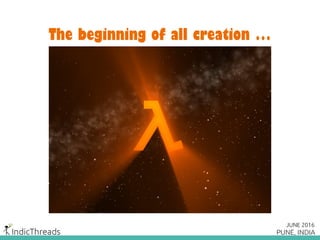
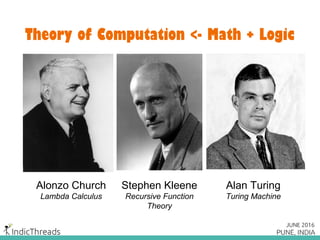
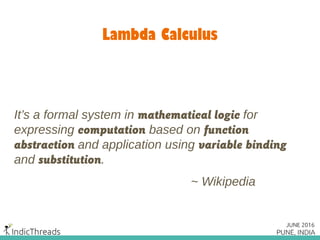

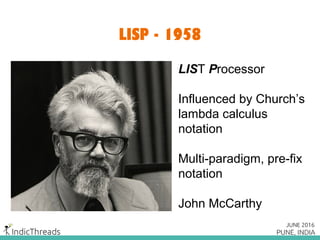

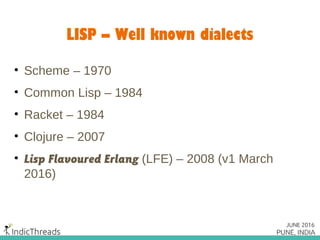






![Erlang – Higher-order functions
%base salaries
S = [10000, 30000, 40000, 15000].
%The Bonus calculator
Bonus = fun(X)-> X + X*0.2 + 1500 end.
%Total salaries
T = lists:map(Bonus, S)
>> [13500, 37500, 49500, 19500]](https://image.slidesharecdn.com/fp-pushkar-160729083836/85/Functional-Programming-Past-Present-and-Future-16-320.jpg)
![Erlang – Higher-order functions
%find total salaries exceeding 30000
MoreThan30K = fun(Y) -> Y > 30000 end.
lists:filter(MoreThan30K,T).
>> [37500, 49500]
You just learnt “map” and “filter”. Let them sink in!](https://image.slidesharecdn.com/fp-pushkar-160729083836/85/Functional-Programming-Past-Present-and-Future-17-320.jpg)


![Haskell – Pattern Matching
-- construct a List from an list
makeList (x:xs) = Cons x (makeList xs)
makeList [] = Nil
-- construct an list from a List
makeArr (Cons x (xs)) = x:(makeArr xs)
makeArr Nil = []](https://image.slidesharecdn.com/fp-pushkar-160729083836/85/Functional-Programming-Past-Present-and-Future-20-320.jpg)



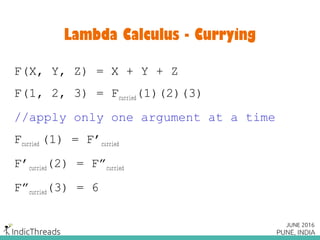

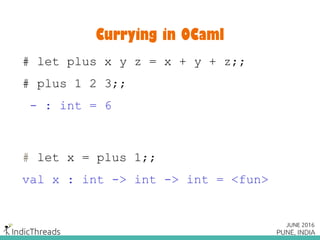

![Currying in OCaml
Function to add 2 to all numbers of a list
let add2 x = x + 2
List.map add2 [1;2;3;4;5];;
Function to add 3 to all numbers of a list
let add3 x = x + 3
List.map add3 [1;2;3;4;5];;](https://image.slidesharecdn.com/fp-pushkar-160729083836/85/Functional-Programming-Past-Present-and-Future-28-320.jpg)
![Currying in OCaml
With currying:
let add x y = x + y
List.map (add 2) [1;2;3;4;5]
List.map (add 3) [1;2;3;4;5]
•Better reuse of code
•Improved readability](https://image.slidesharecdn.com/fp-pushkar-160729083836/85/Functional-Programming-Past-Present-and-Future-29-320.jpg)


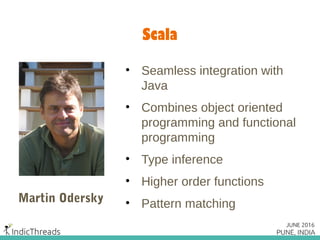
![Scala
Simple functional code to find the length of a list:
(no loops in functional programming!)
def listLength (list: List[_]): Int =
list match {
case Nil => 0
case _ => 1 + listLength(list.tail)
}
Any problems here?](https://image.slidesharecdn.com/fp-pushkar-160729083836/85/Functional-Programming-Past-Present-and-Future-33-320.jpg)

![Scala - TCO
No! You have tail recursion and tail-recursion
optimization (TCO)
def length(as: List[_]): Int = {
@tailrec
def length0(as: List[_], count: Int = 0): Int =
as match {
case Nil => count
case head :: tail => length0(tail, count+ 1)
}
length0(as)
}](https://image.slidesharecdn.com/fp-pushkar-160729083836/85/Functional-Programming-Past-Present-and-Future-35-320.jpg)


![Clojure
(defn fib[n]
(condp = n
0 1
1 1
(+ (fib (- n 1)) (fib (- n 2)))))
user=> (time (fib 40))
"Elapsed time: 2946.136757 msecs"
165580141
user=> (time (fib 40))
"Elapsed time: 2882.10746 msecs"
165580141](https://image.slidesharecdn.com/fp-pushkar-160729083836/85/Functional-Programming-Past-Present-and-Future-38-320.jpg)

![Clojure - Memoization
(def m-fib
(memoize (fn [n]
(condp = n
0 1
1 1
(+ (m-fib (- n 1)) (m-fib (- n 2)))))))](https://image.slidesharecdn.com/fp-pushkar-160729083836/85/Functional-Programming-Past-Present-and-Future-40-320.jpg)
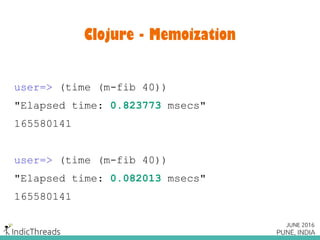





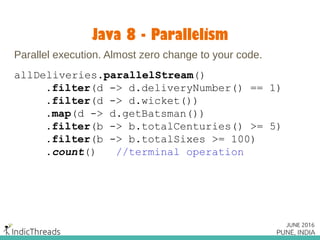
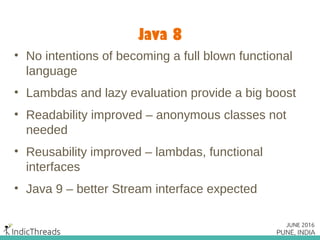

![Idris – dependent types
ListType : (singleton : Bool) -> Type
ListType False = List Nat
ListType True = Nat
sumList : (singleton : Bool)->ListType singleton->Nat
sumList False (x :: xs) = x + sumList False xs
sumList False [] = 0
sumList True x = x](https://image.slidesharecdn.com/fp-pushkar-160729083836/85/Functional-Programming-Past-Present-and-Future-50-320.jpg)





